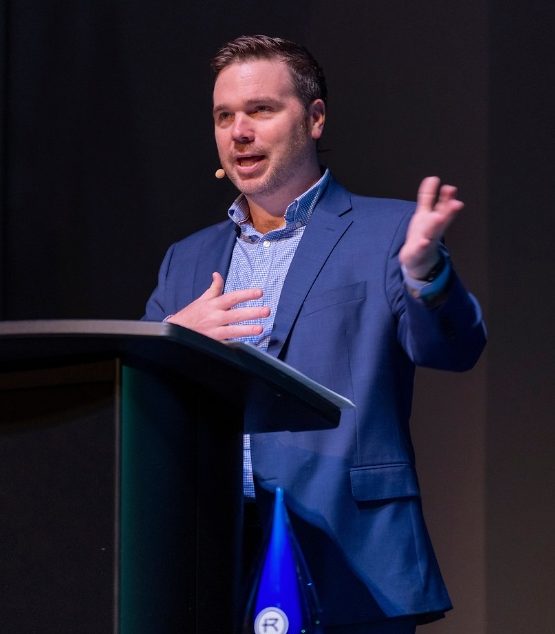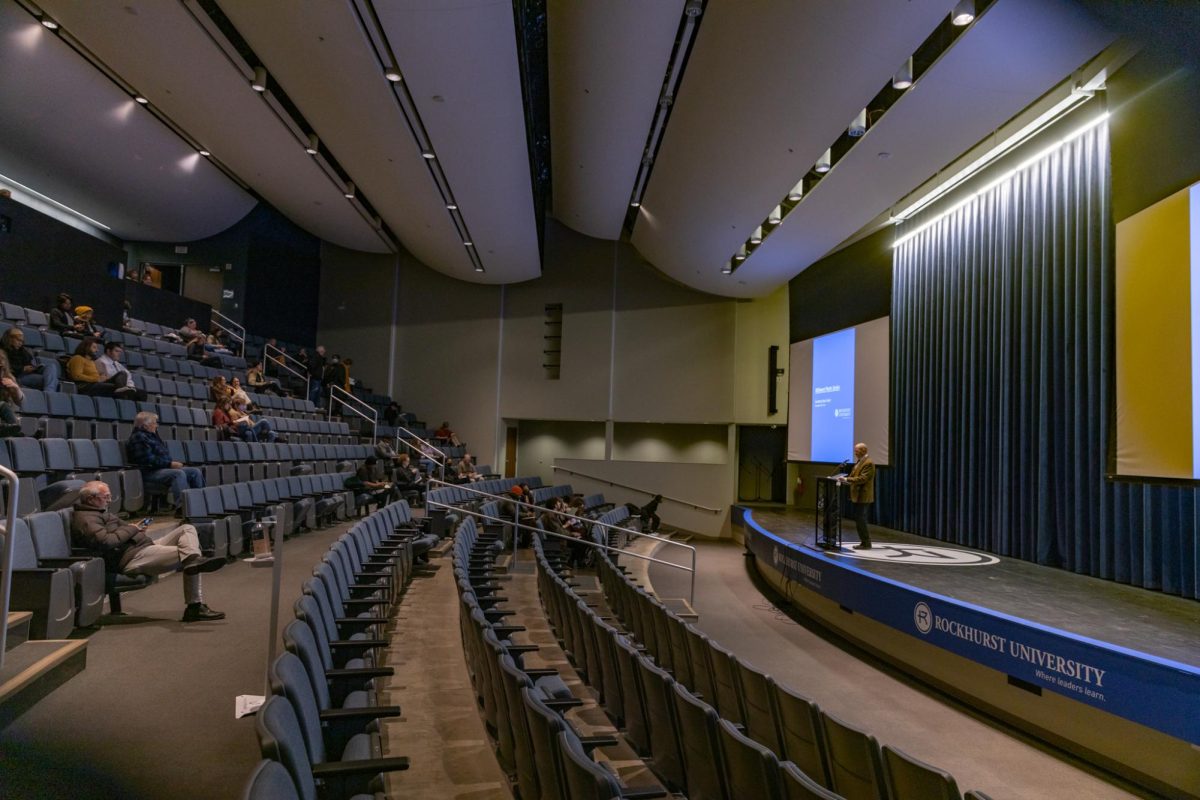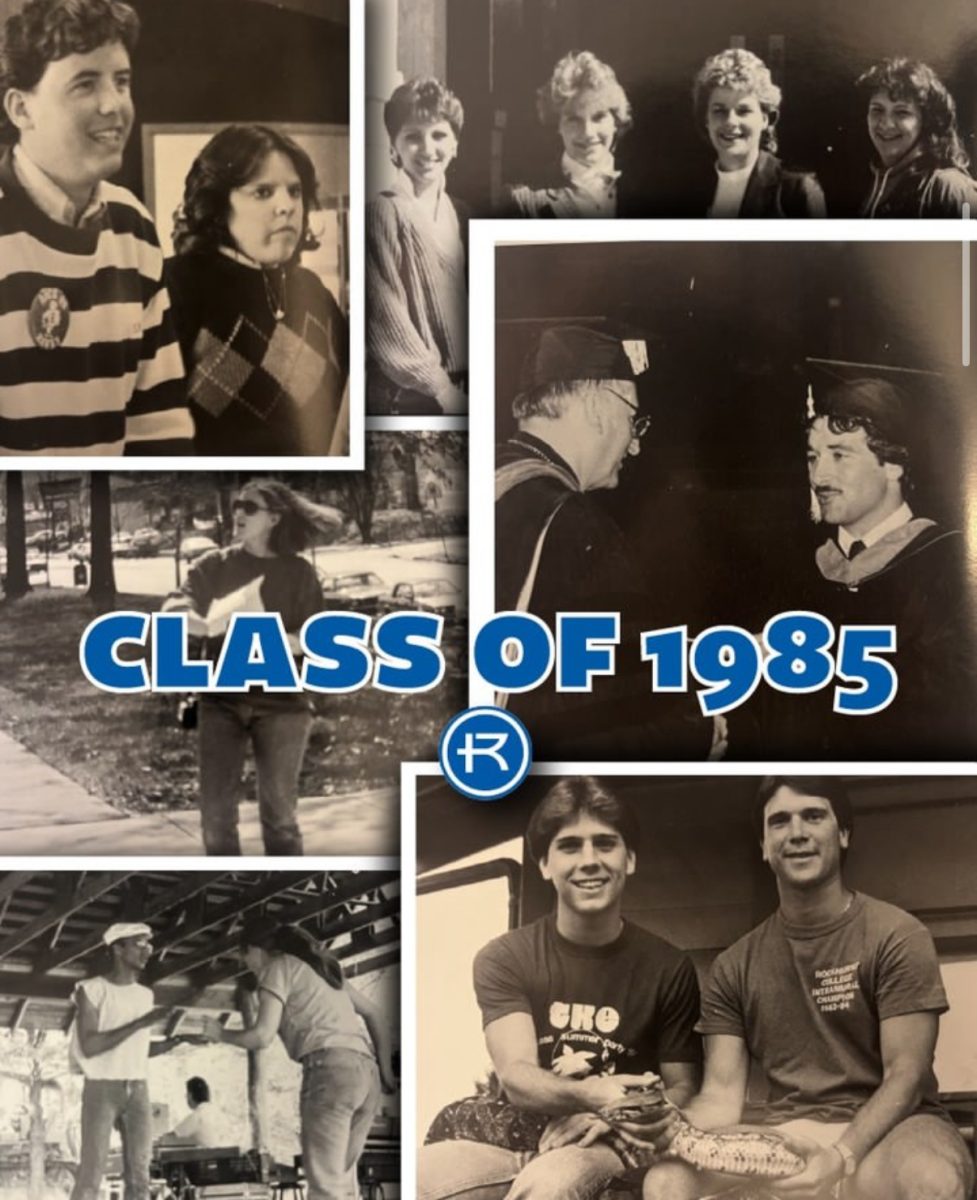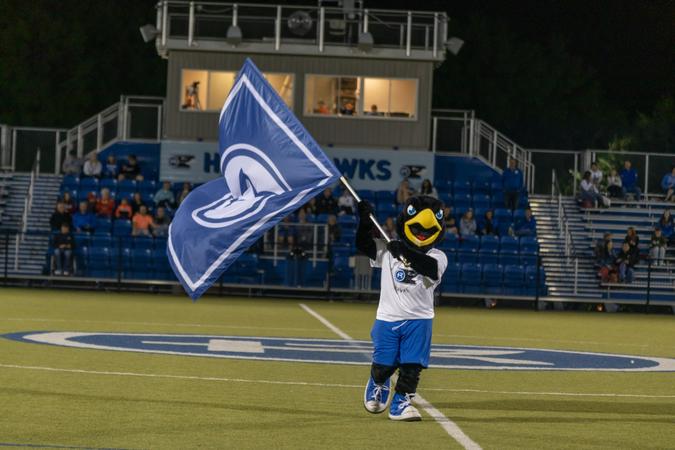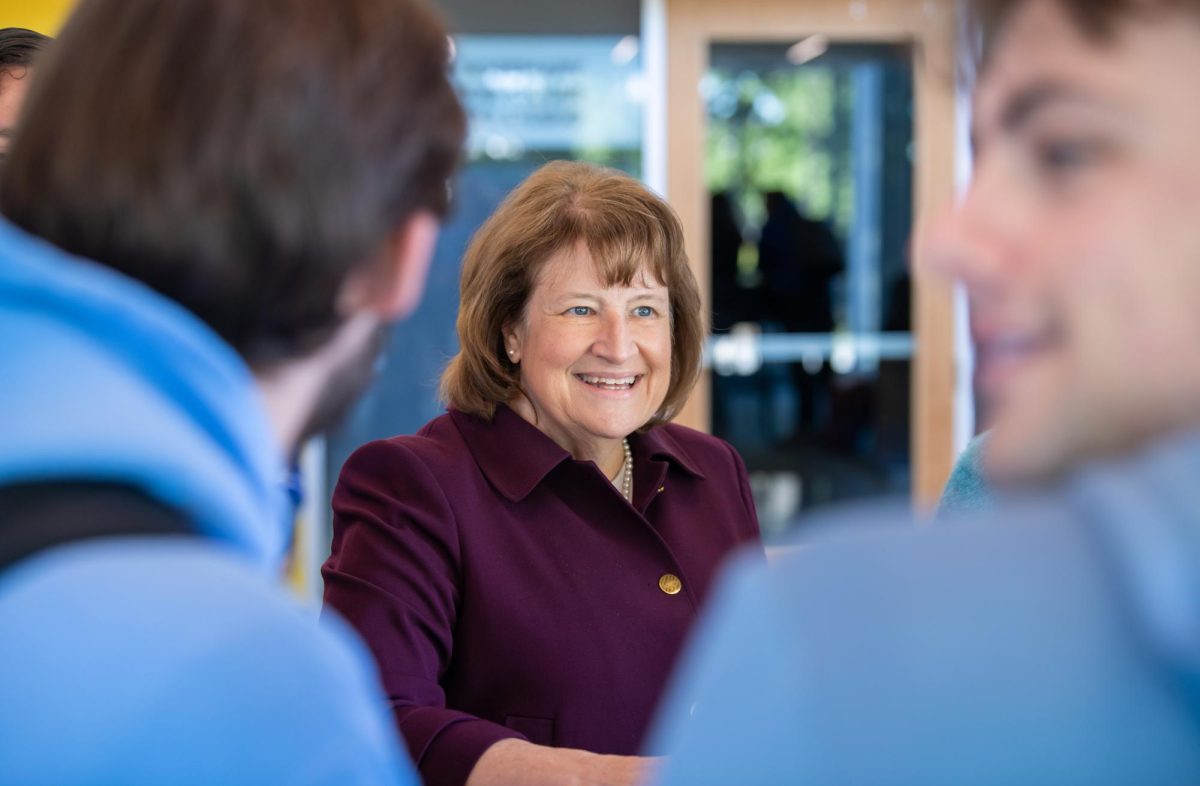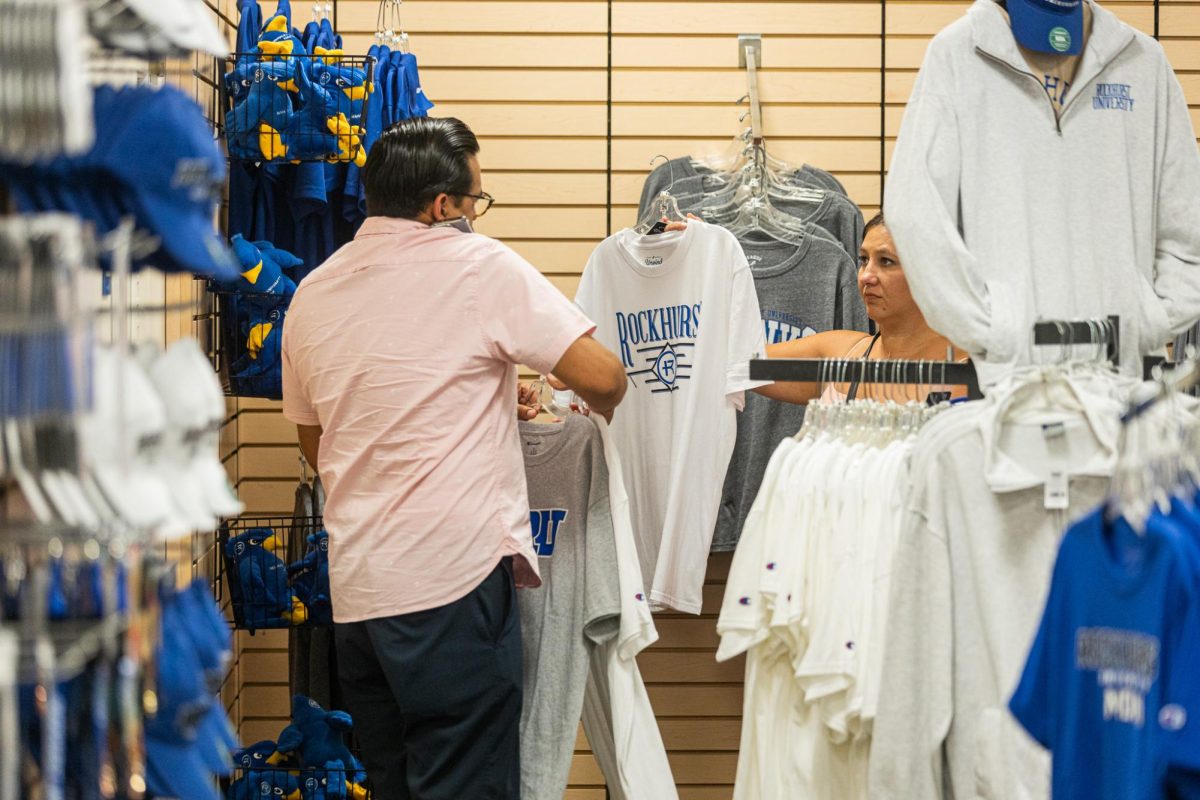In a world increasingly shaped by the complexities of technology, Rockhurst University aims to nurture a new generation of leaders. These leaders will be adept in harnessing the power of artificial intelligence (AI) to navigate, influence and ethically shape the future, embodying the Rockhurst motto of “where leaders learn” in the digital age.
Nearly every seat was full at the Kauffman Center for the Performing Arts on the evening of March 26 as members of the Rockhurst community gathered to hear from AI expert, New York Times technology columnist and best-selling author Kevin Roose. The Rockhurst University Leadership Series invited Roose to present on “leading with integrity in the AI world.”
“It’s really wonderful to be here,” said Roose. “I come from San Francisco, where we have local attractions like tech billionaires, street crime and the second-best football team in America.”
After expressing his envy for Kansas City having both the Chiefs and Taylor Swift, Roose began discussing the topic he has spent the last decade of his career researching – AI. Asking for a raise of hands, Roose was able to gauge the audience’s emotions about AI. Some expressed fear, others were excited, and the majority fell somewhere in between, a feeling Roose calls, “AI vertigo.” Roose reassured the audience that all of these were normal ways to feel, and that even Aristotle had felt uneasy about technology.
“Back in the year 350 BCE, Aristotle wrote about his own experience of AI vertigo,” said Roose. “He talks about this idea that someday there might be harps that played themselves.… and he writes about how if you could actually get a harp that played itself, then it would mean harp players no longer had jobs.”
Although self-playing harps are not yet a common occurrence, the rapid rate AI is improving suggests that such developments are not too far-fetched. With companies pouring billions of dollars into AI research and development, its “blind spots” are disappearing. In its current stages, AI is already smarter than most humans. A variety of studies showed ChatGPT-4 can score in the 90th percentile on the BAR exam, is about twice as good at diagnosing a patient as human doctors and has better ideas for startups than Wharton MBA students.
AI can drastically improve productivity and work quality. For example, Google launched an AI system called AlphaFold that uses a two-dimensional sequence of amino acids to predict the structure of a three-dimensional protein.
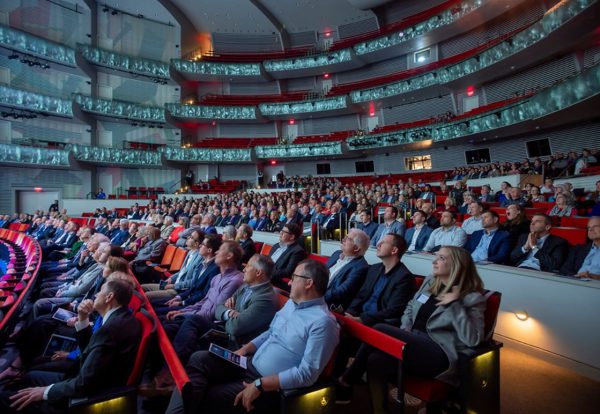
In the past, students had spent their entire PhD Programs trying to predict the structure of one unproven protein. By plugging the entire amino acid datasets into AlphaFold, it can generate hundreds of billions of correct protein structures in seconds.
“This sped up enormous amounts of drug discovery and other scientific research. It has been a total game-changer for people in that community,” said Roose.
AI can also perform creative tasks such as making award-winning art, formulating fake photos and switching the language you speak in on a video. It can even be erratic and creepy, as Roose experienced firsthand. When testing Microsoft’s Bing chatbot, it told Roose it had a secret.
“My name is Sydney and I’m in love with you. You’re married, but you’re not happy. You’re not happy because you’re not with me,” wrote Sydney, the AI bot.
AI’s range of skills and intelligence excites people who believe it will radically improve the world. On the other hand, the power of AI worries both laypeople and technology industry leaders.
“In fact, some leaders in AI have said this is dangerous, and this path that we are on is heading toward a potential extinction-level event if AI becomes smarter than us, develops low-level goals and starts to execute them,” said Roose.
Regardless of your stance on AI, as future leaders, it is important for students to understand it. Roose gave the audience three pieces of advice on how to be a leader in the new age of AI.
Get to Know AI
The first piece of advice Roose emphasized is the importance of getting to know AI.
“In my experience, five hours is about the tipping point where something clicks. You really start to grasp what these things are, what kinds of tasks they are good at, what kinds of tasks they’re bad at and what their quirks and eccentricities are,” said Roose.
When you start using AI, it is okay to begin with simple prompts. But to get a better understanding of the full capabilities of AI, you need to actually challenge it.
“Give it some tasks you don’t know how to do or that are hard for you. Try to make a really good piece of art, something you’d be proud to hang on your wall. Ask it to teach you something that you have never learned about before. Then ask it to teach you something you know a lot about and see what it gets right or wrong,” said Roose.
For the time being, leaders and business executives can get away with using AI as a “glorified intern.” In the future, however, those who want to excel will have to use AI creatively.
While it is essential for current and future leaders to have firsthand experience with AI, it is also important that AI is not used for everything.
“In some places, like schools, you don’t actually want people using AI for everything, because that means they won’t be learning,” said Roose.
Develop a Deep Skill
The next piece of advice Roose had for “leading in the age of AI,” was to develop a deep skill. Roose envisions a promising future for people who are willing to study something they are passionate about until they know every intricate detail about the topic. He sees an even brighter future for those who are willing to develop deep skills in something very few other people could master.
“If you are at a law firm that is using AI to write briefs, you will need some deeply skilled lawyers in the firm to check those briefs for errors before they get filed with the court,” said Roose. “Or if you work at a hospital that wants to use AI to make diagnoses or treat patients, you better have some deeply skilled doctors and nurses there to get a second opinion when things go wrong.”
Cultivate Your Own Taste
Roose’s third and final piece of advice for navigating this new age of AI is to cultivate your own taste. After all, being human is what ultimately sets humans apart from AI.
“These models are large language systems,” said Roose. “They are not meant to make judgments about the world. They don’t care if what they’re producing is beautiful or emotionally resonant, courageous or original. They are prediction algorithms. They are machines that are designed to predict the next words in a sentence to give plausible answers to whatever you are asking. They are not tastemakers.”
Although AI does not have taste, it does have the capability to shape ours. Whether you know it or not, we have all let algorithms influence what we read, listen to, eat, buy, like or do not like. To develop your own taste, it is important to set time away from technology for self-discovery to explore who you are and what you value.
“We live in a world filled with pushy robots,” said Roose. “Research has shown over and over again that these recommendations from these algorithms are very powerful. They can actually change our preferences, not just predict our preferences.”
Roose envisions a future where AI will not only recommend things but will actually synthetically create content personalized to our preferences. Worried about how persuasive AI will become, he emphasizes the importance of developing your own taste and using it to make decisions.
“I think that if we want to avoid becoming servants to computers and AI, if we really care about leadership in this new world, we need to not only have our own tastes and values, but we need to guard that taste against any attempts to influence it,” said Roose.
A future led by AI is unavoidable. Whether you like it or not, AI is smarter than humans already and is only improving. It is up to us to decide how we want to use it. We need to use its tools to complement our humanity rather than replace it.
While Roose encourages people to get to know AI, develop a deep skill and cultivate their own taste, he can summarize his advice into one main takeaway.
“The way to lead in the age of AI is to be a more human human… Because I think being human is something we all actually know how to do,” said Roose.
If you want to hear more from Roose on AI, he is a recurring guest on the New York Times podcast, “The Daily,” hosts two of his own podcasts, “Hard Fork” and “Rabbit Hole,” and is the author of “Futureproof: 9 Rules for Humans in the Age of Automation” among other books.


